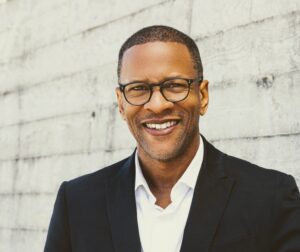The Harlem Small Business Initiative is an interdisciplinary research project from City College that tries to understand and communicate the factors that are affecting the health and performance of small businesses in the community. As well as understanding the type of tangible environment that would be sustainable for small businesses.
The CCNY collaborative team consists of five members: Principal Investigator, Shawn Rickenbacker and Héctor Tarrido – Picart from the Bernard & Anne Spitzer School of Architecture, Michael Grossberg from the Grove School of Engineering, Prabal De from the Colin Powell School for Civic and Global Leadership and Susanna Schaller from the Division of Interdisciplinary Studies at the Center for Work Education.

Shawn Rickenbacker from the Bernard & Anne Spitzer School of Architecture
The team partnered with JPMorgan Chase & Co. Institute and JPMorgan & Co. Philanthropy, who awarded them a grant and access to spending data from Chase customers. During the pandemic, JPMorgan Chase & Co. cocreated the Small Business Initiative to provide original research to underserved small businesses and policymakers to help each navigate fundamental changes in consumer behavior and the ways we occupy the built environment Post Covid. This information will serve as a resource to help guide future decisions, and policy aimed at small business evolution and, growth, recognizing their role in the strengthening of local economies.
“The history and performance of small businesses have long been understood as a critically important component of successful and sustainable communities,” Rickenbacker, the architect and urban data researcher of the group, said. “However, there are various threats to the health of small businesses such as the COVID-19 Pandemic, digital marketing platforms, online shopping, real estate development patterns, gentrification and consumer behavior, etc.”
The data from JPMorgan is customer spending data from 1.5 million residents in New York City, parts of New Jersey, and Connecticut. The data includes zip codes for the spending that the team can use to compare with the eight focus ZIP codes that make up Harlem.
The research has many variables, such as spending at top-tier chain stores versus expenditures at smaller businesses. The data also divides the types of consumer goods into eighteen distinct categories — general goods, clothing, services, restaurants, etc. and types of transactions online and or offline (in-store).
The variety of the data has allowed Grossberg, the computer scientist on the team, to analyze the data to try to understand what the information can reveal about the kind of environment needed for sustaining small businesses. Then he can create a hypothesis and use independent sources to confirm or reject that hypothesis. This approach is practical due to the anonymity, the data set size, and the lack of specificity, such as only showing spending aggregated on a monthly level.
“We need to look at the bigger picture, because otherwise we don’t have much to work with,” Grossberg said. “That’s how we’re trying to leverage the data.”
De, the economist of the group, said he sees the initiative as an opportunity to understand how to protect small businesses from external negative shocks — disastrous events that affect consumer spending, like a pandemic or a natural disaster. He has actually already done research about the effects of the COVID-19 pandemic on New York City.

Dr. Prabal D, Colin Powell School for Civic and Global Leadership
The next step would be to propose and support policies that help these communities through times of crisis.
Rickenbacker said their research itself is a way to support Harlem’s small business community. They can learn about the business models that support changing consumerism habits as well as environmental factors from an urban planning standpoint with key input from Tarrido – Picart and Schaller that can help small businesses.
“The research is intended to serve as both a measure and dialogue with communities to allow for a finer degree of understanding of the true nature of small business and the ecosystem they may rely on,” he said.

Malina Seenarine is a recent graduate of Baruch College where she studied journalism and minored in theater. In addition to writing for The RICC, she’s a contributor for Baruch’s award-winning Dollars & Sense Magazine and wrote for the arts and news section of Baruch’s student-run newspaper, The Ticker. She’s also written for FSR magazine.